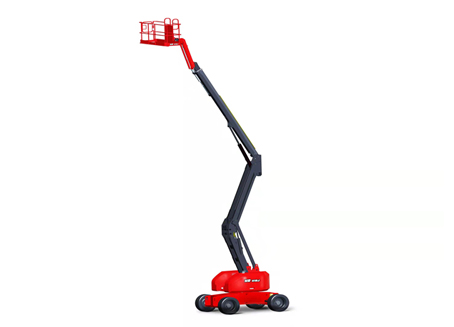When it comes to accessing elevated work areas, telescopic and articulating boom lifts are two popular choices offering distinct advantages based on specific job requirements. Understanding the differences between these two types of aerial work platforms is crucial for selecting the most suitable equipment for your needs.
Telescopic Boom Lifts: Reaching New Heights
1. Straightforward Vertical Reach:
Advantage: Telescopic boom lifts are known for their impressive vertical reach. They extend in a straight line, making them ideal for tasks that require reaching great heights without the need for complex maneuvering.
2. Efficiency in Open Spaces:
Advantage: Suited for open and unobstructed work environments, telescopic booms excel in scenarios where a direct, vertical lift is necessary. They are particularly effective for tasks like construction, maintenance, or installations in spacious areas.
3. Outdoor Capabilities:
Advantage: Telescopic boom lifts often come equipped with robust features, making them suitable for outdoor applications. They can navigate uneven terrain and provide stability in diverse environmental conditions.
4. Speed and Productivity:
Advantage: Telescopic booms are generally faster in operation compared to articulating booms. This makes them an efficient choice for time-sensitive projects where swift vertical access is critical.
Articulating Boom Lifts: Flexible Access to Challenging Spaces
1. Articulation for Versatility:
Advantage: Articulating boom lifts feature multiple articulated joints, allowing them to bend and reach over obstacles. This flexibility makes them ideal for tasks in confined or hard-to-reach spaces.

2. Precise Positioning:
Advantage: The ability to articulate and position the boom precisely makes articulating lifts suitable for tasks that require careful maneuvering around obstacles, such as building facades, equipment installations, or maintenance in tight spaces.
3. Indoor Applications:
Advantage: Articulating booms are well-suited for indoor applications, especially in facilities with limited space. Their ability to navigate around obstacles and position the platform precisely is valuable in settings like warehouses, manufacturing plants, or commercial buildings.
4. Reduced Outreach:
Consideration: While articulating booms offer exceptional flexibility, they typically have a shorter horizontal outreach compared to telescopic booms. This factor should be considered when evaluating the specific requirements of a task.
Choosing the Right Lift for Your Needs: Considerations
1. Task Requirements:
Telescopic: Choose a telescopic boom for tasks that demand substantial vertical reach in open spaces.
Articulating: Opt for an articulating boom when precise positioning around obstacles or working in confined spaces is essential.
2. Environmental Factors:
Telescopic: Ideal for outdoor applications and uneven terrain.
Articulating: Well-suited for indoor applications and tasks with limited space.
3. Maneuverability:
Telescopic: Straightforward vertical reach with less intricate maneuvering.
Articulating: Greater flexibility for navigating obstacles and reaching challenging spots.
In conclusion, the choice between telescopic and articulating boom lifts hinges on the specific demands of your job. Consider the nature of the tasks, the work environment, and the desired level of flexibility to make an informed decision that enhances both safety and efficiency in elevated work projects.
535
0
0
All Comments (0)
Previous: How to Maintain PVC Hand Gloves Making Machine
Next: How to Choose the Right Telescopic Boom Lifting Height?
If you are interested in sending in a Guest Blogger Submission,welcome to write for us!
Comments